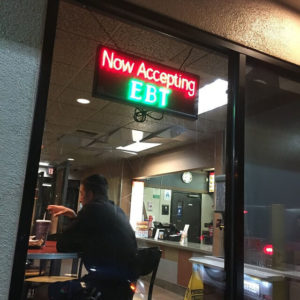
President Donald Trump has proposed new work requirements for food stamp recipients. (Adam Dachis, Flickr)
Poor and working class White and Black Americans who receive food stamps could be significantly hurt by President Donald Trump’s planned changes to the Supplemental Nutrition Assistance Program (SNAP) for low-income people, commonly known as food stamps, which includes increasing work requirements.
As part of his proposed 2018 budget, the president wants to cut about $192 billion, or 25 percent, from the program over the next 10 years. It’s part of a total of $1.7 trillion in spending cuts contained in the budget proposal before Congress.
The cuts would be achieved by cutting back eligibility, which expanded along with cost during the recession, and imposing additional work requirements. That could make it more difficult for people in need to receive benefits. A requirement already exists that mandates some adults without dependents to work. But under the new proposal, more recipients, including those with children and those older than age 49, may have to work in order to receive benefits.
The food stamps program is among the largest of the 15 programs administered by the Food and Nutrition Service of the Department of Agriculture. In 2016, the average monthly benefit was about $126 per person, according to the agency.
The number of Americans receiving food stamps has increased to about 44 millions, up from about 26 million in 2007, when the Great Recession began. Many people have come to rely on the program, particularly low-income families in the African-American community, which has an unemployment rate twice as high as whites.
“It took a long time for us to recover from the Great Recession, especially for those who are most vulnerable in our society,” Craig Gundersen, professor of agricultural economics at the University of Illinois told USA Today. “There’s just a number of people who continue to struggle.”
While Agriculture Department data shows that whites make up the majority of those receiving food stamps, Blacks and Hispanics also have relied on the program to help make ends meet. Critics of Trump’s proposal worry they could be hurt disproportionately.
Some policy analysts also believe that the same people who supported Trump’s election would be greatly impacted by stricter work requirements as well. Chronic joblessness among poor whites in rural counties throughout the South and Rust Belt cities has helped increase welfare rolls.
In the 1990s, the number of Americans receiving assistance begin to decline after President Bill Clinton and Republicans agreed to reform the system, in part, by adding work requirements. But a preponderance of evidence suggests that those who could no longer receive federal/state assistance did not move up the economic ladder, but instead the majority of recipients required to work remained poor — or got poorer — over the long term.
Conservatives have long maintained that government aid only encourages recipients to become more dependent on Uncle Sam. The new White House administration in defending its plan has said that Trump’s work requirement would help put those receiving food stamps on the path to self-sufficiency.
“If you’re on food stamps and you’re able-bodied, we need you to go to work,” Mick Mulvaney, the White House’s budget director, told reporters on May 22. “If you’re on disability insurance and you’re not supposed to be, if you’re not truly disabled, we need you to go back to work. We need everybody pulling in the same direction.”
Like some fellow Democrats and other opponents of Trump’s plan, former Labor Department Secretary Robert Reich, now a professor at the University of California at Berkeley, said the changes would do more harm than good for people who rely on the programs. He pointed to the fact that Americans across the political spectrum could suffer if Trump’s policies are enacted.
“Both independents and non-voters rely on Medicaid, Social Security disability, and food stamps, which Trump’s budget and Trumpcare slash,” he wrote May 30 on Twitter.
Rep. Barbara Lee, Democrat of California and a House Budget Committee member, was even more direct, calling Trump’s budget “heartless.” “Their morally bankrupt budget steals health care from children and food assistance from hungry families in order to pad the pockets of billionaires and defense contractors,” she said in a statement.
“If their budget is enacted, after-school programs will close. Seniors will be forced to forgo medical care. Parents will have to choose between paying the rent and putting food on the table.”


